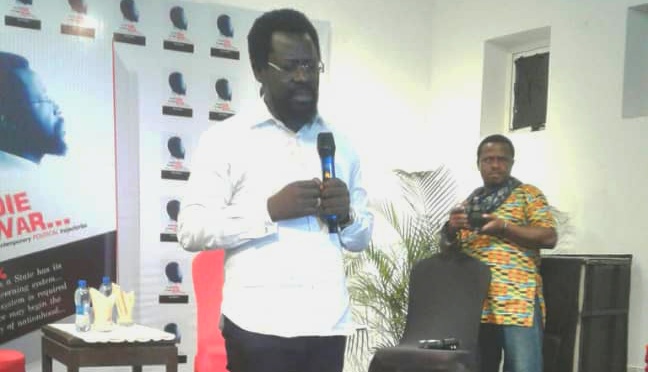The Ligali Ayorinde High/Magistrate Court House built by the Lagos State Government and commissioned by the Governor, Mr. Babatunde Fashola SAN at the Epe Local Government Area, Epe, on Wednesday, January 7, 2015.
Akwa Ibom Liberation Movement (AILM) says the local government autonomy bill recently signed into law by President Muhammadu Buhari, may not be in the best interest of Akwa Ibom state and its people.
The socio-political group said while it appears ideal to grant financial and administrative autonomy to local government Areas the reality on ground makes its implementation near impossible.
In a statement, Emmanuel Sam, leader of the group, the amended law is idealistic and will fail because it ignores present realities.
Sam psaid the new law throws up a set of challenges in local government administration which must be resolved in order not to bring chaos, conflict and insecurity in the state.
Advertisement
He disclosed that from its preliminary research the organization found out “that there was no thorough assessment of the economic impact the development will have on States. What happens to States like Lagos with 37 Local Council Development Areas, LCDAs which are not recognized by the Constitution. Will the LCDAs, which brought government to the grassroots cease to exist as they cannot benefit from federal allocation? Similarly, in Akwa Ibom State, it is a known fact that some Local Government Areas especially the 10 foremost LGAs would be rendered non-viable with overstretched wagebills due to over bloated workforce.”
He said it reeks of double standard on the part of federal government to sign the local government autonomy bill into law whereas it is shying away from addressing a fundamental matter such as federalism that affects the very existence of the country.
He urged the incoming 7th assembly of Akwa Ibom to carefully weigh all pros and cons of the law as it affects the state before ratifying it.
Advertisement
His full statement below:
The Local Government Autonomy Bill which was passed on Tuesday, 6 November 2018 by the 8th National Assembly, granting full financial and administrative autonomy to all the 774 Local Government Areas across the country was recently signed into law by President Mohammadu Buhari. Expectedly, this has generated a lot of debate across the country.
While commending proponents of local government autonomy for winning a long drawn battle and sympathizing with state governors who will directly bear the consequences of this political experiment, it is pertinent to categorically state that this development calls for caution in order not to invite anarchy.
Sadly, in Akwa Ibom State, the issue which to a great length is purely a constitutional matter has been politicized and used by mischief makers to overheat the polity and cause disaffection within the state.
We at AILM have inquired into the historical, political, constitutional and economic perspectives of the subject matter, paying particular attention to how it will affect Akwa Ibom people. Based on our findings we state as follows:
1) That historically Local Governments are not sovereign like nation-state as such their administration is subject to a superior government. The 1999 Constitution of the federal republic of Nigeria recognized this fact and made provisions for local governments through joint accounts. However, subsequent amendment of Section 162 by the National Assembly provides a consequential provision for the making of the Local Government Councils full third tier government, financially and administratively independent from State Governments.
2) That it is sheer double standard on the part of Federal Government to hurriedly sign Local Government Autonomy Bill into law whereas it is shying away from addressing fundamental matters that affect the very existence of the country such as federalism, which precedes the former. We perceive that the central government is seeking to divert attention from growing calls for federalism by this action.
Advertisement
3) That the new law throws up a set of challenges in Local Government administration which must be resolved in order not to bring chaos, conflict and insecurity in the state. As such the incoming 7th Assembly of Akwa Ibom State House of Assembly should take time to weigh all pros and cons of the law as it affects the State before ratifying it. The State legislature should not be in a hurry to domesticate the law because it is not enough to legislate on a law of such heavy consequence without measures taken to ensure smooth implementation in the State.
4) That while most States are yet to ratify the new law, it is important to note that there was no thorough assessment of the economic impact this development will have on States. What happens to States like Lagos with 37 Local Council Development Areas, LCDAs which are not recognized by the Constitution. Will the LCDAs, which brought government to the grassroots cease to exist as they cannot benefit from federal allocation? Similarly, in Akwa Ibom State, it is a known fact that some Local Government Areas especially the 10 foremost LGAs would be rendered nonviable with overstretched wagebills due to over bloated workforce.
5) That there is serious threat of massive job cuts in Local Lovernment Areas as fallout of this development. Just as one State cannot transfer its workers to other States, Local Governments will not accept indigenes of other Local Governments. In Uyo Local Government Area for instance, over 70% of primary school teachers and primary health workers serving there are not indigenes. As a result of autonomy, Uyo LG authorities can decide to reject non-indigenes posted to them by the Local Government Service Commission. And, then employ only indigenes strictly on need basis. What happens when all the other Local Government Councils follow suit?
6) That some Local Government Areas including Ikot Ekpene, Abak, Uyo, Eket, Oron and others with overstretched workforce may still be unable to carter for monthly wagebill even if it comes directly from federal allocation coupled with aggressive revenue generation. Who then will they turn to for assistance to provide basic amenities and security?
Advertisement
7) That it is worrisome that apart from vague directives from the Nigerian Financial Intelligence Unit, NFIU, on disbursement of funds to Local Governments, Federal Government is yet to put in place concrete measures to ensure judicious use of allocations sent directly to Local Government authorities and how to checkmate misappropriation. It would be foolhardy to assume that the State Government and National Union of Local Government Employees, NULGE, will perform those critical functions.
8) That it is condemnable, unpatriotic and insensitive for some Local Governmnt chairmen to sponsor media attacks on the Governor, who is not opposed to the principle of Local Government autonomy but demands that due process be followed and peculiarities of the economic realities in states be taken into consideration while implementing the new law.
Advertisement
In conclusion, AILM continues to call for caution by stakeholders specifically in Akwa Ibom State as efforts are made to resolve issues thrown up by the Local Government Autonomy Law. Akwa Ibom people, we recently re-elected Governor Udom Gabriel Emmanuel for a second term in office being satisfied by his performance during his first term and trusting his capacity to handle tough financial and socio-economic challenges. Let us all continue to support him as he pursues options that will best serve our longterm and collective interest. We call on the State Government, Local Government Service Commission, Local Government authorities, NULGE, political class and every stakeholder in the State to urgently resolve the issue of impending massive retrenchment which we have identified as the immediate area of conflict.
We continue to pledge our unalloyed support to the Government and people of Akwa Ibom State, urging everyone to sustain the liberation we all fought for.
Advertisement
Add a comment






